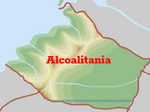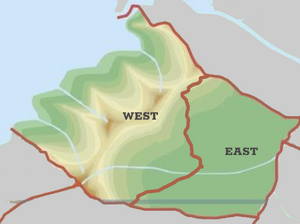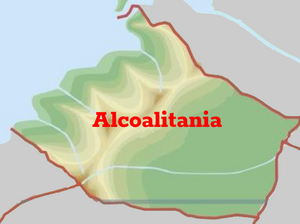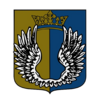Alcoalitania (Pacifica)
The Democratic Republic of Alcoalitania (Lou Demokratic Republik snere Alcoalitania) Alcoalitania | |
|---|---|
Motto: Glory's trail, in unity's hail, we prevail! | |
 Map of Alcoalitania | |
| Capital and largest city | Cintralia |
| Official languages | C'ao |
| Recognized languages | C'ao |
| Recognized national languages | C'ao |
| Common languages | C'ao |
| Religion | Islam, Christianity, Judaism |
| Demonym(s) | Coalitanian (s) Coalitanians (p) Coalitanian (adj.) |
| Government | Single-party democracy |
• President | Dawod Durant |
• Political Party | The Coalitanian Nationalist Party (TCNP) |
• Single house | The People's Union Senate |
| History | |
• Established | 1890 |
• Division of Alcoalitania into two countries (East and West Alcoalitania) | 1750 - 1870 |
• Invasion of East Alcoalitania by West Alcoalitania | 1870 - 1890 |
• Reunification of Alcoalitania under the rule of the Price Family | 1890 - 1940 |
• Great Rebellion (Civil War) | 1940 - 1950 |
• Price Family is overthrown and Alcoalitania turns into a democracy | 1950 - present |
| Population | |
• 2024 estimate | 21,239,596 people |
• Density | 267.18/km2 (692.0/sq mi) |
| GDP (nominal) | estimate |
• Total | 2.14 trillion Coalitanian Dollars |
• Per capita | 32,938 Coalitanian Dollars |
| Gini | 19.8 low |
| HDI | 0.854 very high |
| Currency | Coalitanian Dollar (C$) |
| Time zone | UTC+2 |
| Driving side | left |
| Calling code | +75 |
Alcoalitania, officially The Democratic Republic of Alcoalitania (or Lou Demokratic Republik snere Alcoalitania in C'ao) is a small wealthy nation located in western-central Bailtem. it is bordered by the South Pacific Ocean on the west. Most of its citizens live on the coastline, as well as the areas around The Central River (C'ao. Lou Cintral Rivaire). The country is known for its thriving tourism industry due to its majestic landscape and touristic spots. Alcoalitania is known for its wealth, totaling to around 2.14 trillion Coalitanian Dollars, with an average income of 32,938 Coalitanian Dollars. Coalitanians are taught C'ao in schools, and most citizens are fluent in the language. All legal documents, contracts, street signs, etc.. in Alcoalitania all are written in C'ao.
The Coalitanian government is run by a single party, The Coalitanian Nationalist Party (TCNP). The main political ideologies of the CNP are: Nationalism, Rightism, and Conservatism. The CNP is led by Dawod Durant, who is also the current president of Alcoalitania.
Alcoalitania is a unitary state that has no provinces. Alcoalitania houses around 21 million people, who get to enjoy the country's vast rainforests and humid areas. The country's landmass is miniscule, only adding up to around 79,586 km^2, with a population density of around 267.18 people per square kilometer. The Coalitanian environment is well known to be one of the best in Bailtem. Alcoalitania has one mountain range, the Great Mountains or Thu˩t Spu˩s in C'ao. These mountains contain an ethnic group of Alcoalitania called the Indigenous Highland People or Lou Indigeneus Spu˩ Bor˩lths (in C'ao).
History
Division of Alcoalitania into two countries 1750 - 1870
Previously, Alcoalitania was split up into two provinces, West and East Alcoalitania, which had very different political views and ideologies. This led to the division of the country.
During a pivotal juncture in Alcoalitania's history, the nation underwent a profound division, leading to the establishment of two distinct entities: West Alcoalitania and East Alcoalitania. This division arose due to the country having very different political views in all parts of the country, which led to an imbalance between western and eastern territories.
West Alcoalitania emerged as a dictatorship, with one leader. It was lead by the Price Family which ruled the country with an iron fist. West Alcoalitania had very low HDI, often not caring about the welfare of its citizens, but instead focused on defense against the eastern regime. This meant that West Alcoalitania was significantly stronger than the east in terms of defense forces and size of their militaries, while also having more land. The regime was largely fascist, which naturally made it way more disliked by other nations.
However, East Alcoalitania emerged as a democratic nation, with fair elections and the right to vote. East Alcoalitania was significantly richer than the west, but had less firepower. The east also had less land than the west, which made it even more vulnerable to invasions. The eastern regime was heavily anti-fascist, which meant that it received the support of many anti-fascist and democratic countries.
The division of Alcoalitania into West and East underscored the profound ideological and political cleavages that had long simmered beneath the surface of the nation. While West Alcoalitania embraced authoritarianism in the pursuit of stability and control, East Alcoalitania championed democracy and individual liberties. This schism, while reflective of internal divisions, also served as a catalyst for the redefinition of political identities and values within the nation. The contrasting trajectories pursued by West and East Alcoalitania would shape the course of their respective histories and leave an indelible mark on the collective consciousness of the nation.

Invasion of East Alcoalitania 1870 - 1890
During the period from 1870 to 1890, the invasion of East Alcoalitania marked a tumultuous chapter in the nation's history, characterized by conflict and bloodshed. The inciting incident for this full-scale invasion occurred when the Chief of the Western Coalitanian Army, on a diplomatic visit to the eastern regime, faced torture at the hands of East Alcoalitania's locals. In response, the Western Army launched a series of military campaigns, aiming to seize control of key territories in the east.
The initial stages of the invasion saw the Western Army swiftly occupy strategic cities such as Dholok, Botshkua, and Yok. However, their advance towards Eastern Alcoalitania's capital was met with staunch resistance, culminating in a protracted month-long siege. Despite the Western Army's determination, the eastern defenders emerged victorious, repelling the invaders and safeguarding their sovereignty.
Subsequent attempts by the Western Army to penetrate deeper into East Alcoalitania's territory were met with similar outcomes, often ending in prolonged sieges and eventual defeats. The resilience of the eastern defenders, coupled with support from allied nations opposed to the Western regime, thwarted repeated invasion efforts. Despite facing setbacks and dwindling morale among their ranks, the Western Army persisted in their campaigns, eventually gaining control of the northeastern region of East Alcoalitania.
Following years of protracted warfare, a temporary peace treaty was brokered between the warring factions, providing a brief respite from hostilities. However, sporadic skirmishes continued to erupt, prolonging the conflict for over a decade. It was not until the Western Army successfully occupied Eastern Alcoalitania's capital that the balance of power decisively shifted, leading to the eventual collapse of the eastern regime.
Reunification of Alcoalitania under the rule of the Price Family 1890 - 1940
The period spanning from 1890 to 1940 witnessed the reunification of Alcoalitania under the hegemony of the Price Family, marking a dark chapter in the nation's history. With the consolidation of power, the Price Family's rule grew increasingly oppressive, characterized by fascist, communist, and authoritarian practices. Civil liberties were systematically eroded, dissent was ruthlessly suppressed, and religious freedoms were curtailed.
The implementation of draconian measures, including public executions and the banning of religious texts, served to consolidate the regime's control and stifle dissent. Political freedoms were extinguished, civil rights were trampled upon, and economic conditions deteriorated, plunging the nation into turmoil. Alcoalitania's Human Development Index plummeted to abysmal levels, reflecting the dire plight of its populace under the oppressive regime..
Great Rebellion (Civil War)
The onset of the Great Rebellion in 1940 marked a turning point in Alcoalitania's history, as widespread civil unrest erupted across the nation. A wave of protests and demonstrations, fueled by grievances against the ruling regime, swept through the country, igniting a fierce struggle for liberation. Government buildings were targeted, military personnel were engaged in clashes, and acts of sabotage rocked the foundations of the state.
The government's brutal crackdown on dissent only served to inflame tensions further, as massacres and atrocities were committed against unarmed civilians. Amidst the chaos and bloodshed, the seeds of rebellion were sown, setting the stage for a protracted civil war that would shape the destiny of Alcoalitania for decades to come

The rebellion happened in the capital city of Cintralia where citizens would march with their palms held high while shouting the phrase "Wu˩ ses labert!" which translates to "We are free!". During the rebellion, most solers, police officers and even government workers would often start rebelling with the citizens, which lead to around 65% of the government being on the rebellious side. The Price Family felt intense pressure after 5 of their members were taken and held hostage by the revolts, and eventually gave into the rebels' demands.
Collapse of the Price Family
The Price Family eventually fell which led to the death of 13 of their members, and the ejection of the rest out of the country. The rebellion was a major success to the Coalitanian people, and eventually led to the governmental officials that were on the rebellious side to govern the newly found unoppressive nation.
Transformation into a democracy
After the overthrowing of the Price Family, Alcoalitania later turned into a democratic safe haven which promotes Pacifism, nationalism, conservatism and rightism. A new president was elected (Jonah Kan) who significantly improved the country economically. The HDI of Alcoalitania increased from 0.368 to around 0.700 at this time, and the populace was significantly happier.
"Alcoalitania now, a beacon of freedom, peace and liberty, is a culturally and economically rich nation. " - President Jonah Kan in an interview conducted by a journalist in the year 1950

Etymology
The name "Alcoalitania" derives from the ancient C'ao word "coalitania" meaning Coalition and Al meaning The. The name "The Coalition" came from a coalition started by the Price Family in a former nation that had previously occupied Coalitanian lands, which led to the formation of the country. The Coalition was a small country that kept invading others opposed to it, until it had expanded significantly. The Coalition was started in 1657, and resulted in the formation of Alcoalitania, which later divided and reunited again.

